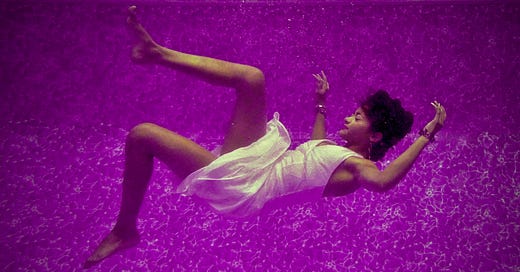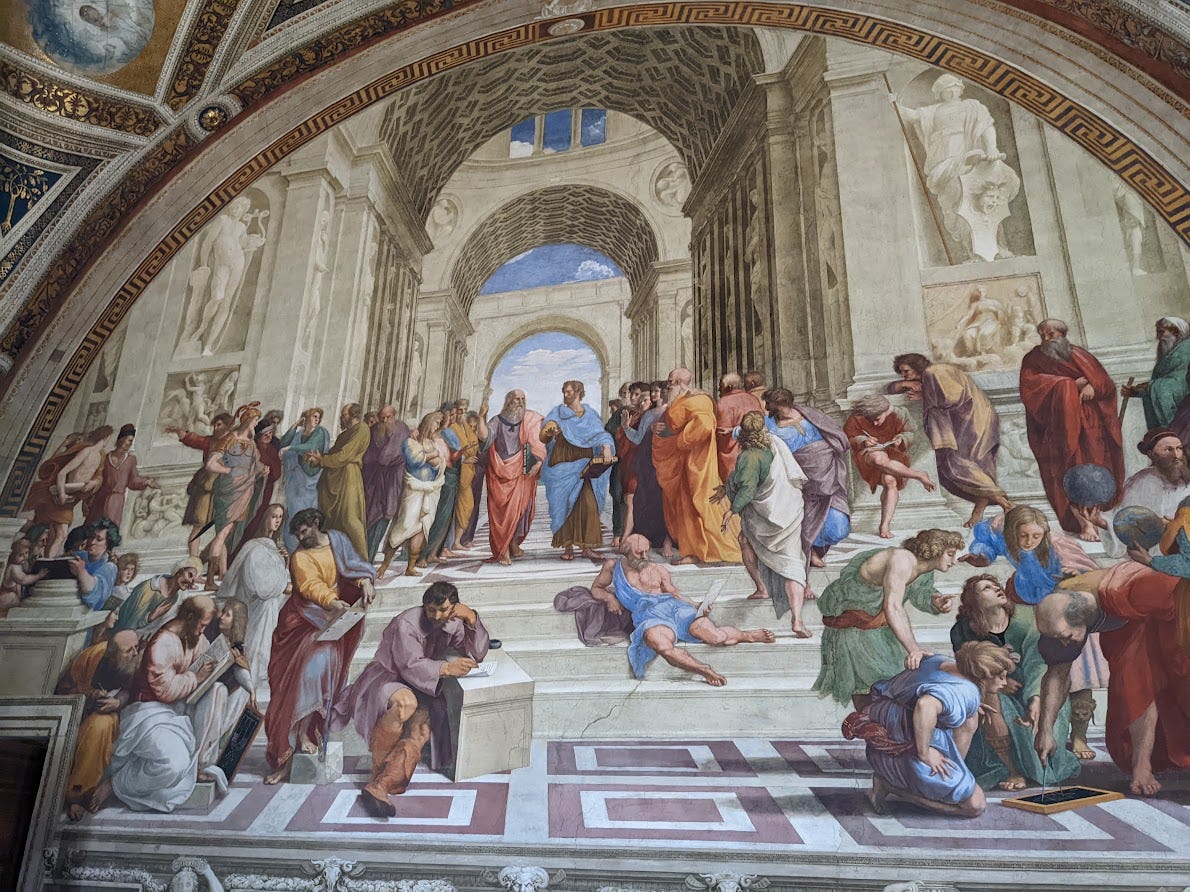Science
Scientists assure us that reality is made up of tiny particles humming along at the speed of light. That theory jives with data collected by their scientific instruments, of course. And it works miracles that would have seemed wondrous to our ancestors—like flicking on a light switch or sending a text message.
Notice, though, that theory of reality is a parallel construction; built up next to our lived experience but not overlapping with it. It’s an abstraction. One that makes reliable predictions, but an abstraction nonetheless. The actual experience of being human doesn’t feel anything like navigating electron fields. It feels like navigating tangled clouds of emotions and social relations, none of which shows up on scientific instruments.
How much of reality, then, is science actually mapping for us? It’s far more limited in scope than our scientific authorities would care to admit. Let’s dust off the old ideas of the Greek philosopher Plato and take them for a spin.
The Past
Many of us have had the horrifying experience of realizing that a memory of ours never actually occurred. It happens at family gatherings, where we often end up comparing notes about times long past. That unsettling experience makes you wonder how many of your memories are actually false. The courts are discovering, in this era of electronic recording devices, that eyewitness testimony is the least reliable form of evidence. Our memories feel like reality, but they are disturbingly faulty.
Then there is the Mandela Effect. That’s when large numbers of people collectively remember something that just wasn’t so. It’s named after the collective delusion that South African president Nelson Mandela was assassinated sometime in the late 80s (he wasn’t). There’s a whole reddit community chock full of examples. Perhaps you remember the Berenstein Bears, who were actually the Berenstain Bears? Or the cornucopia logo that the Fruit of the Loom brand never really used? Or the monocle never actually sported by the Monopoly man? To browse that subreddit is to be confronted by your false memories. It’s a hell of an experience.
Authority
We stride through our lives, confident in our assumption that we’re anchored to some concrete past. But in reality we are adrift on currents of imagination and delusion. It’s like Napoleon is supposed to have said: what is history but a lie agreed upon? Disturbingly, our present is every bit as ethereal as our past. Just as we don’t question our memories, we don’t stop to question authority.
Most of us have no more first-hand experience with birds of paradise than we do with faeries or leprechauns. But we assume that if we hop on a plane and fly out to Indonesia, we’ll find those birds waiting for us. We really, really hope that’s the case, at any rate. Textbooks and professors and nature documentaries have assured us it is so. And those experts also tell us that there’s no such thing as fairies or leprechauns. So we include the birds in our mental model of reality and exclude the fairies. Most of the reality we believe we’re living in is built out by taking the authorities’ word for it. Precious little is built on actual first hand experience.
I’ll never be able to experience your reality and you’ll never be able to experience mine. But we can swap information back and forth. That’s what’s happening when we compare notes at family gatherings or when we accept as gospel the dictates of the authorities. Notice that the information we exchange takes the form of language.
Reality is like a poker game where we can never show each other our hands. The game plays out according to an exchange of words. That’s how reality works; it’s collectively mediated by language and only indirectly related to the cards in our hand. Reality isn’t made of electrons or quarks. The basic building blocks of reality are the words we exchange.
Narrative
To sculpt the David, Michelangelo first had to envision his masterpiece entombed within a block of solid marble waiting to be released. And that’s exactly how we manufacture reality. We keenly remember the things that match the story we’re living out. We forget, like chips of discarded marble on the floor of Micheangelo’s workshop, experiences that aren’t compatible with our story. If you think you’re a loser, you’ll remember your failures and forget successes that don’t match the narrative. But winners overlook failures and focus on their successes instead.
The sculpture we create with our biased minds is shaped like a story with a beginning, a middle, and an end. It’s a sculpture in the medium of time. And for some reason, we crave drama. We just can’t seem to enjoy a movie unless Darth Vader almost wins. It thrills us to no end when the plucky rebel alliance pulls it out in the end against all odds.
If reality is made of language, then it's shaped like a story. And a harrowing story at that.
Platonism
And that brings us, at last, to Platonism. Plato argued, way back in the day, that true reality is the conceptual realm of ideas—like a narrative arc. He suggested that the physical world is only an illusion sculpted out of that. It's the exact opposite of the Aristotelian notion that reality is that which we observe with our senses. Raphael painted this controversy in his The School of Athens. At the focal point of this masterpiece, Aristotle is rendered with his overturned palm hovering over the ground, suggesting that the sensory world is the primary reality. Next to him strolls Plato, with his index finger pointing straight up, insisting on the primacy of the realm of ideas.
The realization that the Earth moves around the sun blew a lot of minds in the late Middle Ages. Up until then, any fool could see the sun “moving” across the sky. It was a paradigm shift. And we would be very foolish to assume that all such paradigm shifts are already behind us. The replacement of the geocentric model of the solar system with our current heliocentric model was a wholesale inversion of reality; one that characterizes the transition from the Medieval to the Modern era. It destroyed the credibility of the church, which was the authority that dictated reality for people in those days.
Our institutions of science picked up the fallen baton of authority. It dictates reality for us still to this day. But another Galileo is due to topple it. We’ve imagined that science is the end-all, be-all since it replaced the authority of Christian church. Just as people thought they had finally gotten to the core of reality when Christianity replaced paganism.
The notion that we are tiny minds moving around inside of a massive creation is an idea that was unquestioned by both the church and its replacement, science. But our minds are not inside the universe; the universe is actually inside our minds. Evidence has already started rolling in: our scientific authorities have no way to interpret the double-slit experiment or the placebo effect. Objective reality is an illusion, just as the sun “moving” across the sky is an illusion. We are overdue for another inversion of reality, and that paradigm will characterize the transition from the Modern Era to whatever is next. Plato is coming for his revenge…







This deserves more reads because it touches on such great ideas. I loved this!
I would like to add onto this argument by sharing two things. But first, a slight disagreement: I don’t think reality is an illusion. At least, it is not an illusion in the sense of how the word is usually interpreted. I’d like to think that how we perceive things to be “real” is just a small snapshot of the existence of reality as a whole.
To elaborate, I’ll now add onto your argument:
1. Everyone has a hierarchy of values because paying attention to everything all at once is too much information to cognitively process. The fact that you are reading this sentence word by word, phrase by phrase, means that at this moment you are valuing my comment more than the wall in front of you, the trees outside, the electronics next to you, and so on. Thus, what you perceive is dependent on what you value. You see the world, physically or metaphysically, through the lens of what you value. Thus, you simultaneously include and exclude when processing information in the act of perception itself. Thus, we are only but cameramen and reality will only be but a framed picture of something bigger.
2. Even science is predicated on a faith: seeking what is true is Good. There’s no scientific and epistemically sound reasoning to “prove” seeking what’s true is good, yet the sciences operate under such assumptions anyways. You eloquently point out that world of what is (science) and the world of how to act (metaphysics in a sense) go hand in hand. We will never escape the problem of faith; we will believe our authorities, our documentaries about birds, and so on. Unfortunately for philosophers like us, we will go far and beyond to try to find ways to escape this problem of assumption to but no end. To me, there’s some beauty in that though :)